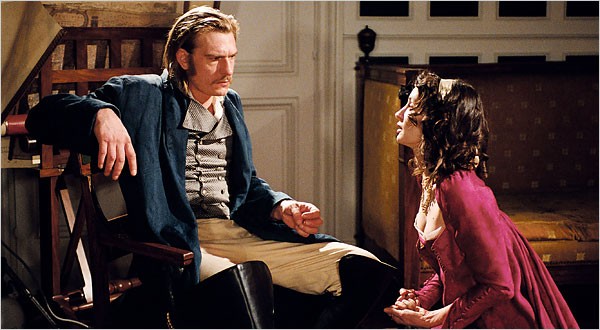

Reviews of Recent Independent, Foreign, & Documentary Films in Theaters and DVD/Home Video
Directed by Jacques Rivette Produced by Martine Marignac & Maurice Tinchant Written by Pascal Bonitzer & Christine Laurent, based on the novella by Honoré de Balzac Director of Photography William Lubtchansky Edited by Nicole Lubtchansky Music by Pierre Allio Released by IFC Films Language: French with English subtitles. France/Italy. 137 min. Not Rated. With: Jeanne Balibar, Guillaume Depardieu, Bulle Ogier, Michel Piccoli & Barbet Schroeder It is exceptional when a visually arresting period drama finds the core of the emotional life of its characters, and fans of Honoré de Balzac will be delighted that director Jacques Rivette has found them in his strikingly faithful adaptation of The Duchess of Langeais. The film’s French title translates literally as the double (or more)-entendre of Don’t Touch the Axe, what Balzac originally called the central novella in his 1834 trilogy History of the Thirteen. Set during the French Restoration, each story features a mysteriously powerful secret society that is powerless to overcome passionate and zealous love, which Rivette has used for source material for less literal interpretations. Balzac was inspired to write as revenge on a coquette who lead him on without succumbing, but he created no mere portrait of a 19th century mean girl. Unfolding slowly in three acts, the opening setting is an austere Carmelite convent on the Spanish island of Majorca. General Armand de Montriveau (Guillaume Depardieu, looking more and more like his father, Gérard, in his youth) seems untowardly moved by the music of the mass celebrating the French army’s reinstatement of the Bourbon monarchy on the Spanish throne. He stays on the island, even after his troops have left. First through the ambassador, then the nuns’ priest, he negotiates a meeting with a French nun. Their unexpectedly heated exchange pushes the movie into a flashback five years earlier. Antoinette (Jeanne Balibar), the young Duchess of Langeais, is in an arranged marriage of convenience with her never seen husband, and keeps busy with a nightly round of balls. When a genuine Napoleonic hero appears, the handsome Montriveau, she is intrigued despite his dourness that bores the chattering classes. Like a reverse Scheherazade, she thrills to his tales of an excruciating expedition down the Nile, interrupting him to regale her night after night at parties, in her parlor, and her carefully arranged boudoir. Where Eric Rohmer’s talky costume drama The Lady and the Duke focused on a duo sparring over politics, Rivette strips down the verbal match between the duchess and the general to a debate about the nature of love, specifically love outside the bounds of a very rigid society of hypocrites. The dialog and written on-screen mordant descriptions direct from Balzac are the antithesis of Jane Austen’s gentle satire of sense vs. sensibility and pride vs. prejudice. Rivette eschews the opulent conventions of bringing literary classics about dangerous love affairs to the screen, such as Max Ophüls’s The Earring of Madame de… or Martin Scorsese’s The Age of Innocence. The beautifully costumed erstwhile lovers are intimately surrounded only by ambient sounds, from the seagulls and ocean waves isolating the rock-bound convent, to the footsteps, overheard conversations, ticking clocks, and chamber music echoing in heavily gilded rooms in the fashionable neighborhood of the Faubourg Saint-Germaine. There is no lilting orchestral ebb and flow around the couple’s interchanges as the general, round by round, challenges her witty arguments about fidelity, religion, and scandal, until all that is left is bared emotion. Balibar, as she did in Rivette’s Va Savoir, makes a woman’s metamorphosis captivating, even as Antoinette’s crucial confrontation with Armand seems to spring from forceful machinations as extreme as in The Taming of the Shrew, and considerably more vengeful. One can almost forget that Greta Garbo was slated to portray the duchess in an aborted project in the late ‘40s.
The result is a hybrid of conventional genres. Film viewers transported by beautiful costumes, settings, and the climax (an old-fashioned rescue
attempt from a full-rigged sailing ship) could feel dragged down; the only dueling is of words and feelings. Those who enjoy intellectual and
philosophical battle of the sexes may be put off that the debate takes place within the extreme strictures of a specific period, but Balzac fans will
be the most appreciative.
Nora Lee Mandel
|